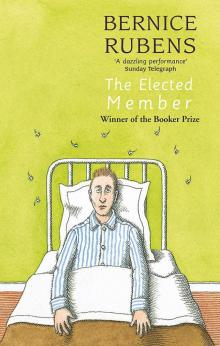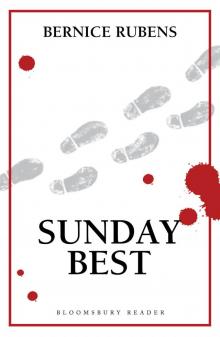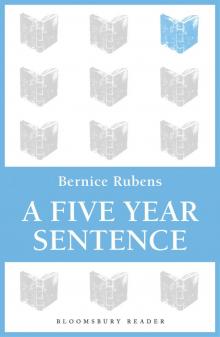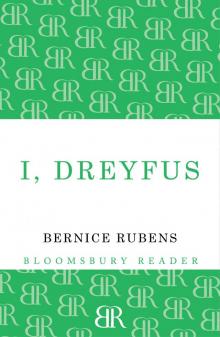- Home
- Bernice Rubens
I, Dreyfus
I, Dreyfus Read online
I, Dreyfus
Bernice Rubens
For Zack, Matty and Dylan
Contents
Part One
Chapter 1
Chapter 2
Chapter 3
Chapter 4
Chapter 5
Chapter 6
Chapter 7
Chapter 8
Chapter 9
Chapter 10
Chapter 11
Part Two
Chapter 12
Chapter 13
Chapter 14
Chapter 15
Chapter 16
Chapter 17
Chapter 18
Chapter 19
Chapter 20
Chapter 21
Part Three
Chapter 22
Chapter 23
Chapter 24
Chapter 25
Part Four
Chapter 26
Chapter 27
Chapter 28
Chapter 29
Chapter 30
Chapter 31
Part Five
Chapter 32
Chapter 33
Chapter 34
Chapter 35
Chapter 36
Part Six
Chapter 37
Chapter 38
Author’s Note
A Note on the Author
Part One
Chapter 1
Jubilee Publishing
London House
Sen Street
London W1
6 June 1996
Alfred Dreyfus, Esq.
7609B
HM Prison Wandsworth
London SW18
Dear Mr Dreyfus
I write to express the interest of Jubilee Publishing in an account of your unfortunate story, told from a personal viewpoint. We know, as you do, that others have written about it. But we are more than interested in your own version. We would be honoured if you would give your earnest consideration to our proposal and communicate your thoughts to us.
Yours truly
Bernard Wallworthy
Managing Director, Jubilee Publishing
Jubilee Publishing
London House
Sen Street
London W1
6 August 1996
Alfred Dreyfus, Esq.
7609B
HM Prison Wandsworth
London SW18
Dear Mr Dreyfus
We communicated with you some two months ago and as yet we have received no reply. We have ascertained that our letter was delivered into your hand and we do hope that you are not indisposed. We would appreciate a swift reply to our suggestions in our first letter.
Yours truly
Bernard Wallworthy
Managing Director, Jubilee Publishing
Jubilee Publishing
London House
Sen Street
London W1
6 October 1996
Alfred Dreyfus, Esq.
7069B
HM Prison Wandsworth
London SW18
Dear Mr Dreyfus
We have again ascertained that our letter of two months ago was delivered into your hand. And we have likewise ascertained that you are not indisposed, that is, not additionally indisposed, given the conditions of your present confinement. It occurs to us that the delay in answering our letters is possibly due to the question of remuneration for your work. If this is so, we would be glad in our next communication to enclose a contract for your perusal. Please let us hear from you very soon.
Yours very sincerely
Bernard Wallworthy
Managing Director, Jubilee Publishing
I sit and look at these letters. I read them over and over again. I know them by heart. I don’t know how to respond. Do I want to write my version of the story? More to the point, do I need to write it? But most important of all, should it be written? Even if I could answer all those questions and finally and with difficulty pick up my pen, I would still be faced with many problems. I would have difficulty, for example, with the very first sentence. In it I would have to write down my name. Isn’t that how autobiographies begin? But my name is a problem. I’m not too sure of it any more. It used to be Alfred. That’s how I was known as a child, with the occasional ‘Freddie’ in my infant years. I answered to Alfred during my years at school. In the cadets, I swore allegiance in that name. Then suddenly, overnight almost, and all over the world, my name evaporated. I was not a person any more. I was a ‘thing’, an ‘article’ with a tag somewhere about my frame. In France for example, the label carried the legend ‘L’Affaire Dreyfus’. I had been rebaptised. My Christian name was now ‘L’Affaire’. In Germany it was ‘Fon’, in Italy, ‘Affare’. Here in England Dreyfus had become my Christian name, followed by a new patronym, ‘Case’. So it is hard for me to tell you my name. You must make your own choice. I myself cling with some desperation to the name my mother gave me. But I have less and less confidence in its sound. The trial robbed me of any sense I may have had of myself, of my own entity. ‘Alfred’ is the name of a stranger I have not seen for some while. The name ‘Case’ suits me adequately I think, and I am sadly beginning to grow used to its sound. Its hollowness exactly translates my lack of self.
So my name is ‘Case’.
My age you know. You will have seen it in the papers. I am forty-eight years distance from innocence. But I find my age is as questionable as my name, for in the last months I have aged greatly and yet, at the same time, I have become a child again. For it is in the recall of those childhood years that I find solace and comfort. So, for my part, I am of any age. I am in infancy and dotage at one and the same time.
My profession too you know, from the journals and the stories they have told. A headmaster. And of the finest school in the land. But what you do not know, either from newspapers or from hearsay, is my view of the case. Can you see reader, how I already regard myself as a case, an ‘affare’, a ‘Fon’, an ‘affaire’? Even I have difficulty in seeing the flesh and blood behind the story, of seeing the body that is parcelled in my own labelled frame. So perhaps after all I should oblige this publisher with my own version, in the hope that I will thereby reassemble the pieces of myself from out of their several strands, to learn that which I truly am, to enable me to whisper ‘Alfred’ to myself, and to know that it is I. Why not? I ask myself. Let others make do with the ‘affaires’, the ‘Fons’, the ‘affares’ and the ‘cases’. And let history make do with them too. I care little about posthumous labels. It is now, in the tide of my forty-ninth year, and in this nightmare of a dwelling, that I must learn to call myself by name. Let the words Alfred Dreyfus echo across the confines of my cell and rebound from the walls into myself again.
HM Prison Wandsworth
London SW18
12 October ’96.
Bernard Wallworthy, Esq.
Jubilee Publishing
London House
Sen Street
London W1
Dear Sir
Yes.
Dreyfus
Chapter 2
It did not take long for the news to spread along the publishing grapevine. Jubilee exalted in its coup and excited the envy and anger of other publishing houses that had lacked the imagination to take the initiative. It was now too late. The publisher was sewn up. A fait accompli. But as yet there was no talk of an agent and in the course of the following week, despite questioning headlines in the press, a shoal of letters arrived at Her Majesty’s Prison in Wandsworth, the honeyed words of which were but the subtitles of their calculations; the foreign rights, the paperback sales, the serial possibilities and the film and television tie-ins equalled a ten to fifteen per cent that was very fat indeed. So they wrote, enclosing their sta
mped addressed envelopes, which postage would hopefully be added to their commission.
But not Sam Temple. Sam Temple didn’t write. He phoned. He phoned the governor of Wandsworth Prison and made an appointment to pay Dreyfus a visit. He arrived at the gates hotfoot, and long before Dreyfus’s mail had been sorted.
Sam Temple was not popular amongst the literary agents’ fraternity. Not least because he was too successful. He was pushy, it was said, and unscrupulous. Most likely they considered he was a closet queer. But what’s more, he was one of ‘those’.
But Sam Temple wasn’t pushy. He simply got things done. Neither was he without scruple. His dealings, compared with most literary agents, were offensively straight. As to his sexual proclivities, he kept a wife and two children in the country and was rumoured to have a mistress in London. No. Sam Temple was neither pushy, unscrupulous, nor a homosexual. But certainly he was Jewish. As was Dreyfus, the other agents reminded themselves in a whisper over a pre-prandial sherry. For the English are known to be of a polite persuasion and their anti-Semitism is of the most courteous kind. Sam Temple himself did not believe he could reap any advantage from the common factor between himself and his hoped-for client. Dreyfus was known as a closet Jew and might well bristle at any reminder of this aspect of his identity. Temple would skirt it. The purpose of his visit was business. If that could be settled to both their satisfactions, friendship might well follow, as it often did with many of his clients. He sincerely hoped so in this case, for he was convinced, like many others, of Dreyfus’s innocence.
Alfred Dreyfus would not be the first of Temple’s prison clients. He had two of them on his list, and one of them, a convicted murderer, had begun his writing career in Wandsworth. Temple had been a frequent visitor and their business connection had led to a firm friendship. During that time, Temple had had reason to discuss his clients’ cases with the governor of the prison and those meetings too had developed into a strong relationship that continued outside the prison walls. It was through the good offices of this governor that Temple was able so quickly to secure a meeting with Dreyfus.
He sat in the governor’s office.
‘Is he going to write his story?’ the governor asked.
‘He has agreed with a publisher.’
‘It will be interesting to read. I think he is an honest man. I think he might even be innocent. That’s off the record of course.’
‘I had that same impression when I went to his trial,’ Sam Temple said. ‘There are rumours of an appeal.’
‘There have always been rumours. Ever since he was sentenced. But you need new evidence. And people are frightened.’
‘So he could spend the rest of his life here?’ Sam Temple said.
‘It’s possible. Come,’ the governor rose. ‘I’ll take you to him. It’ll have to be in his cell. You’re way outside visiting hours. He’s in solitary, as you know. That is his choice. You can have fifteen minutes. You’ll be doing most of the talking, I’m afraid. He’s a pretty silent man, our Dreyfus.’
The governor led the way through the main block, then climbed the spiral staircase. Sam followed, flicking his pen along the upright metal supports in order to break the terrible silence of the place. Thus he orchestrated their climb to the top, and once on the landing he put away his pen and followed the governor to Dreyfus’s cell.
A warder stood outside the door and unlocked it as they approached.
‘Fifteen minutes, Sam,’ the governor said again. ‘The warder will see you out.’ He shook Temple’s hand. ‘I’ll see you again no doubt. And no doubt,’ he smiled, ‘quite often.’
Sam slithered into the narrow cell opening allowed by the warder. Dreyfus rose from his cot and, as Sam heard the cell door close behind him, he had a sense of sharing a confinement. It somehow put him at his ease. He smiled.
‘My name is Sam Temple,’ he said. ‘I am a literary agent.’ He put out his hand. Dreyfus took it and Sam felt how limp was his grasp, and he tried not to be affected by it. ‘May we sit down?’ Sam said.
Dreyfus nodded and Sam sat on the cot since there was no other seating. Dreyfus sat at his side, though at a distance.
‘I’m not acquainted with your profession,’ he said. ‘Indeed I don’t even know what a literary agent does.’
‘It sounds more pompous than it really is,’ Sam said. He noticed that his companion’s face was shadowed by a pall of indifference. Nevertheless, he laboured to outline the functions of an agent, and under certain headings in order to shorten his recital, but at no time during his explanation did Dreyfus show a flicker of interest. Sam then moved on to the earnings potential of such an autobiography, hoping perhaps that that aspect might stir a little enthusiasm. But Dreyfus’s apathy persisted.
‘I had not given a thought to contract and monies,’ he said. ‘I shall write it in any case. Not out of any desire for wealth or out of moral compunction, but simply as a personal need.’
Sam Temple marvelled at the length of the sentence. They were the first words Dreyfus had spoken for a long time. Such a reticent man might well be a good writer, he thought. ‘That’s a good enough reason,’ he said. ‘Would you then leave all the accounting to me? I will get the best deal I can for you.’
Dreyfus nodded, but with little interest.
‘Money is always useful, Mr Dreyfus,’ Sam said.
‘It cannot clear my name.’ Dreyfus stood up, signalling that he wished the visit to be terminated. Sam doubted whether at any time he could woo the man’s friendship.
‘It only remains for you to sign the contract,’ Sam said. ‘It gives me authority on your behalf.’ He handed Dreyfus a pen which the prisoner took, and without the least perusal he penned his signature on the dotted line. Then he went to the door and called the guard.
‘Is there anything I can do for you on the outside?’ Sam asked.
‘Thank you,’ Dreyfus said. ‘There is nothing.’
Sam Temple returned at once to his office and put in a call to Jubilee Publishing. He had no intention of conducting any discussion on the telephone. He knew that instrument served as a convenient cover for dishonesty and prevarication, the speaker safe in the knowledge of the absence of visual give-away. He simply used his call to make an appointment and, as casually as possible, to plead its urgency. The secretary obliged him with a meeting that very afternoon.
When Bernard Wallworthy was appraised of Sam Temple’s appointment, he regarded it as an irritation in his otherwise orderly day. Wallworthy was the head of Jubilee Publishing; its chairman was absentee and nominal. He had been with the firm all his working life, starting as a tea-boy, and over the years working his toiling laddered way to his present eminent position. As a boy he had chosen a publishing career because it was an honoured and honourable profession, a respected wing of the establishment ranking with law, medicine and politics. But over the years the profession had been eroded. Now it was riddled with arrivistes, parvenus and upstarts, accountants all of them, whose activities gave off a faint odour of commerce. Literary agencies too had proliferated and had been invaded by the same flavours of ‘trade’. In Bernard Wallworthy’s offended mind, Sam Temple epitomised this alien invasion and he did not look forward to his visit. Yet he could not ignore it. Temple was known to be one of the best agents in town and as such he enticed the best writers. In the old days it had seemed to Wallworthy that agents had rightly been on the publishers’ side. But now men like Sam Temple were speaking out for their writers and the old and comfortable order seemed to have been destroyed. He could not imagine what Temple wished to see him about but, whatever it was, he expected an uneasy hour.
And such expectations were fully realised. Once in Wallworthy’s office, Sam Temple lost no time in declaring himself as Dreyfus’s appointed agent. The news struck Wallworthy below the belt. The joy he had felt in his Dreyfus coup slowly soured. The interference of Sam Temple rendered his triumph into a mere deal.
‘Congratulations,’ he said, with as much en
thusiasm as he could muster. But he couldn’t manage a smile.
‘I’ve come to discuss the contract.’ Temple came straight to the point. ‘Have you given it any thought.’
‘In which way?’ Wallworthy parried.
‘Well let’s start with the matter of the advance,’ Sam said.
‘Well – er – we have to remember that we’re taking a big risk,’ Wallworthy said.
Sam had expected such an instant defence and he was prepared for it. He simply laughed in Wallworthy’s face.
‘The name Dreyfus a risk?’ he said.
‘Well, you can’t say he has a track record as a writer.’ Wallworthy had raised his voice. ‘No doubt Dreyfus will require a ghost.’
‘I doubt it,’ Temple said. ‘I have just come from him. He is most articulate.’
‘You’ve seen him?’ Wallworthy asked. These upstarts get everywhere, he thought. ‘How did you manage that?’ he asked.
‘The prison governor is a friend of mine.’
For a moment Wallworthy considered whether the governor was Jewish too.
‘You have the name Dreyfus,’ Sam was saying, ‘a name that nowadays surmounts all risks.’ Then without taking breath he said, ‘I’m asking for an advance of a quarter of a million pounds, excluding all foreign rights.’
Now it was Wallworthy’s turn to laugh. ‘You’re talking fantasy. Besides, to pay out a single penny might well be considered unlawful. Dreyfus has been found guilty, after all,’ he said.
Sam Temple shifted in his chair, gathered his papers and made to rise. ‘You know, as well as I,’ he said, ‘Dreyfus has as yet signed nothing with you. I could auction this book tomorrow and every publisher in London would put in a bid. And the final offer would be much larger than that which I’m suggesting to you now. I’m doing you a favour, Mr Wallworthy.’
The publisher knew he was cornered. He was seething with hatred for the man. ‘Don’t be hasty, Mr Temple,’ he said. ‘We can discuss it. Would you like some coffee.’
After ten minutes of argument – Temple would allow no longer – Wallworthy yielded.

 The Elected Member
The Elected Member Sunday Best
Sunday Best Nine Lives
Nine Lives Madame Sousatzka
Madame Sousatzka A Five Year Sentence
A Five Year Sentence I, Dreyfus
I, Dreyfus